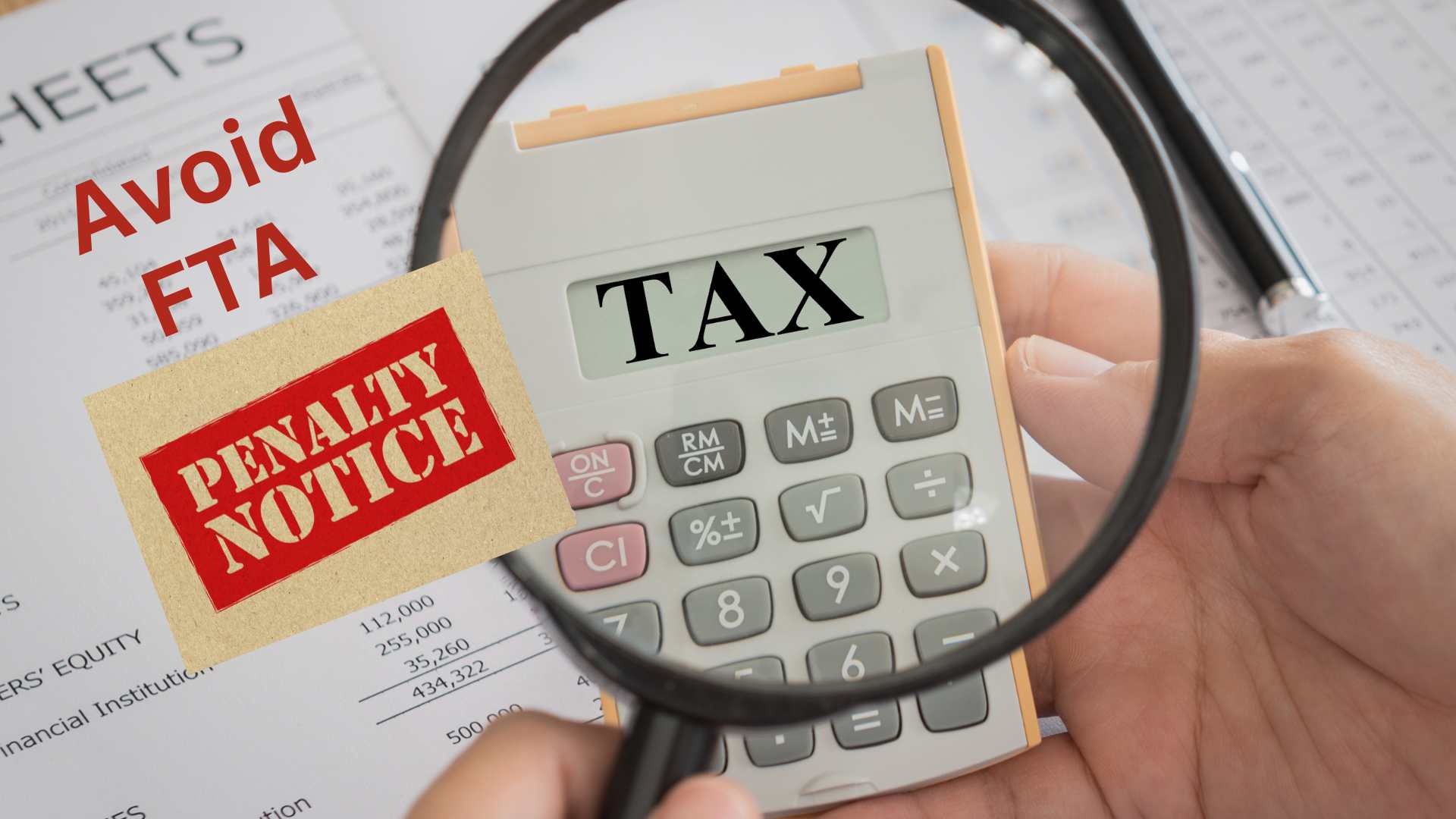Late tax payments can lead to hefty penalties, which can significantly impact a business’s financial health. Understanding the complexities of the Tax system is crucial for every organization.
FTA refers to the Federal Tax Authority in Abu Dhabi. This government entity is tasked with handling, collecting, and enforcing federal taxes and related fines.
In this blog, we will explore the FTA’s late payment penalty structure and share practical tips on how to stay compliant and avoid unnecessary costs.
Key Takeaways
- The FTA manages and enforces VAT, Excise, and Corporate Tax in Abu Dhabi to ensure tax compliance.
- Taxes can be paid via bank transfer, credit card, or electronic dirham on the FTA portal.
- Compliance with FTA rules is essential to avoid penalties and maintain financial stability.
Objectives of FTA
Federal Law No. 13 of 2016 created the FTA, which is headed by the Ministry of Finance (MoF) of the United Arab Emirates. Its main objective is to:
- Manage, collect, and enforce federal taxes effectively.
- Implement effective taxation processes.
- Encourage voluntary tax compliance across the United Arab Emirates including Abu Dhabi.
- The FTA guarantees the financial stability of the United Arab Emirates through effective tax collection and enforcement. It also aims to provide an open and equal tax system for both individuals and companies.
Functions of FTA in Abu Dhabi
The FTA performs an extensive variety of duties related to federal taxation in Abu Dhabi. These include:
Establishing and implementing Tax Legislation
The FTA proactively drafts and sets up federal tax legislation and rules, ensuring an understandable and well-defined structure for tax collection and adherence.
Taxpayer Management and Registration
Companies and individuals that are required to pay federal taxes are required to register with the FTA.
The authority streamlines the registration process and keeps an extensive taxpayer database.
Tax Assessment and Collection
The FTA evaluates tax liabilities for companies and individuals according to their taxable earnings as well as applicable tax laws. It also has strong tax collection systems in place.
Tax Audit and Investigation
The FTA has the right to perform tax audits and inquiries to ensure that individuals comply with tax laws.
This fosters fairness in the tax system and discourages tax avoidance.
Issuing Tax Rulings
Companies can ask for rulings from the FTA that clarify specific tax challenges. These decisions offer helpful direction and support companies in successfully navigating the tax environment.
Tax Dispute Resolution
Through objection processes and appeals, the FTA gives taxpayers the ability to settle disagreements about tax assessments or penalties.
How to pay FTA taxes online in Abu Dhabi?
First of all, it’s essential to establish the company or organization with the FTA through their website. The portal itself offers a number of payment methods for you to choose from. It is advised to make tax payments on time in order to prevent fines and legal issues. The following are ways to pay federal taxes in the Abu Dhabi:
- Using a bank transfer from any nearby bank
- Using a bank transfer from any foreign bank
- Using a credit card or an electronic dirham
Taxes under the federal tax authority in Abu Dhabi
Three types of taxation are imposed by the FTA:
- Value-Added Tax
- Excise Tax
- Corporate Tax
Value Added Tax (VAT), is a passive and transaction-based taxation that is relevant at each step of the supply chain. While registered firms collect the tax on behalf of the FTA, the final consumer typically bears the burden of VAT. This tax significantly contributes to the provision of first-rate services to all citizens of the Abu Dhabi.
Products that are detrimental to human health, including cigarettes and sparkling beverages, are subject to the second kind of tax, known as excise tax. Any company that imports, produces, or distributes such items must register with the Abu Dhabi office of the Federal Tax Authority.
Commencing in 2023, corporation tax is levied on the taxable profits of companies that operate in the Abu Dhabi mainland, with the exception of those that operate in free zones that are exempt from it. At the moment, the corporate tax rate is fixed at 9%.
FTA late payment penalties
VAT, Excise Tax, and Corporate Tax are among the taxes for which the Federal Tax Authority (FTA) in Abu Dhabi imposes late payment penalties. Here’s a brief:
VAT (Value Added Tax)
- Immediate penalty: 2% of the unpaid tax liability upon missing the due date.
- Monthly penalty: 4% of the unpaid money, building up each month until the payment is made.
- Maximum penalty: The maximum penalty is 300% of the unpaid tax.
Corporate Tax
- AED 500 for the initial 12 months of delay in settlement.
- AED 1,000 every month starting in the thirteenth month.
- In addition, unpaid debts from the day after the due date are subject to an annual penalty of 14%.
Excise Tax
- Similar to VAT, the structure of excise tax penalties includes cumulative, monthly, and immediate penalty. Additionally, late payments or inaccurate filings may result in a penalty.
Other Non-Compliance Fines Across Taxes
- Delay in registration for taxes: AED 10,000.
- Failure to maintain proper records: AED 10,000 per infraction (AED 20,000 for repeated offenses).
- Non-cooperation during audits: AED 20,000
Tips to avoid FTA late payment penalty

To avoid late payment penalties from the Federal Tax Authority (FTA) in the UAE, follow these tips:
1.Keep Proper Records
There are two parts to keeping records. Firstly, keeping up-to-date all pertinent records and paperwork in accordance with tax regulations. Secondly, preserving documents for a predetermined period of time.
For example, tax requirements in Abu Dhabi mandate that some records be retained for a minimum of seven years. Therefore, every business needs to have business knowledge and awareness of the applicable legislation. This will allow them to stay in compliance and stay out of trouble.
2. Seek expert advice
Employing tax experts to assist you with your complicated tax situation can be highly advantageous, particularly if you run a business or own multiple properties.
Expert tax accounting teams can help you navigate any complex tax laws or regulations that may apply to your specific situation, provide guidance, and guarantee that your taxes are filed on time and accurately.
3. Stay Updated on Tax Regulations
Businesses should be well-versed in tax procedures in Abu Dhabi. Additionally, the owners of the businesses and the concerned employees need to be informed on the several legal guidelines, bulletins, and public clarifications that the FTA releases on a regular basis.
Maintaining a record of such items can assist you ensure you haven’t overlooked any significant updates or changes pertaining to Abu Dhabi tax regulations. When it comes to significant legislative changes, tax agents can assist you in keeping informed.
4. Conduct Internal Reviews and Audits
Active internal audits and evaluations of the tax procedures can assist in spotting possible compliance problems early.
Consistent internal audits reduce the possibility of non-adherence and associated sanctions.
5. Remember the Tax Date
With all the information surrounding one of the most important tax return deadlines, it’s crucial for individuals to keep track of the date. However, memorizing it can often be a challenge.
Busy lives take over, and dates like the tax payment deadline fall to the back of your mind. Dates such as the submission deadline are forgotten due to hectic lives. However, it must be prioritized.
Firstly, write it in your calendar, both online and on paper, and set up a reminder to notify you at frequent points before the tax dates.
Before you can begin working on the submission, you may need to complete some requirements, including logging an invoice. Don’t forget to set reminders to finish them as well.
6. Plan Deductions to Avoid Penalties
Businesses must specify precisely the range of deductions that apply to business expenses. It is possible to deduct ordinary and essential expenses from taxable income. This covers all expenses, from advertising to travel, and the credits work similarly.
This is only possible if you plan your tax return well in advance to avoid the hassle and claim the necessary deduction. Also, in order to effectively obtain tax credits and deduct expenses, businesses would need to maintain thorough records.
Final thoughts
FTA rules and deadlines must be followed in order to prevent heavy fines that could negatively affect the financial stability of your company.


